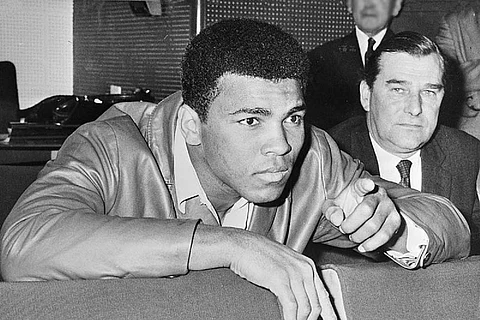

One of the best-known athletes in boxing history, Muhammad Ali, may have set a precedent for the protesting Indian wrestlers by throwing his hard won Olympic gold medal in the Ohio River decades ago. Sporting legend has it that the American boxer and civil rights activist threw his Olympic gold medal into the river after he was refused service in a restaurant in racially-segregated Louisville. On Tuesday, May 30, a group of Indian wrestlers declared that they would do something similar. They sat on the banks of the Ganga, to throw their Olympic gold medals into the river, after weeks of protesting against the sexual harassment they allegedly faced from BJP leader and Wrestling Federation of India chief Brij Bhushan Sharan Singh.
The wrestlers who have been leading the protest against Brij Bhushan – Sakshi Malikk, Vinesh Phogat, and Bajrang Punia – had said that they would immerse their Olympic and World Championship medals in the Ganga on Tuesday, after days of no response from the government. But on Tuesday evening, Bharatiya Kisan Union president Naresh Tikait took possession of the medals and gave the government five-days’ time to address the wrestlers’ demands.
Earlier on Sunday, the protestors had been detained by the police when they marched to the new Parliament building in New Delhi, which was inaugurated by Prime Minister Narendra Modi. Brij Bhushan, a Member of Parliament, was also inside the new building at the time.
The wrestlers’ decision to throw away their medals took you back to the disputed story of Muhammed Ali throwing his medals in the Ohio River.
Muhammad Ali, known for his famous refusal to take part in the Vietnam War and thereby lost his heavyweight title, is said to have thrown the medal that he won at the Rome Games of 1960 after an incident of racial discrimination. In his autobiography The Greatest, co-written with Richard Durham, Muhammad Ali wrote that the incident happened when he went to a luncheonette in Louisville, where Black people were not allowed to dine at the time. He wore his medal and asked for a meal, but was refused service.
Reports also suggested that perhaps this incident did not happen and that the medal was lost somehow. They say that his friends claimed he would never have thrown the medal away, as it had meant a lot for him. The boxer himself is said to have later quipped that he didn't know what he did with the medal.
Another athlete, Welma Rudolph, who was close to Muhammad, told the Sports Illustrated, “I can still see him strutting around the village with his gold medal on. He slept with it. He went to the cafeteria with it. He never took it off. No one else cherished it the way he did.”
An NBC report noted this statement, going on to say that when Ali told the story in his autobiography, he had written, “And I felt no pain and no regret. Only relief, and a new strength.”
A Wikipedia entry regarding Muhammad’s book offers another perspective. “As for the gold medal story, Ali came to deny it was true when the book came out,” the entry quoted Toni Morrison, the Nobel Prize-winning Black American novelist, as having said. The entry also adds that Toni Morrison was at the time of the publication of Ali's autobiography, working as an editor for the publishing company Random House. According to this entry, Morrison also said, “I think it was at a press conference where he was asked about the medal and he said, ‘I don't remember where I put that.’ He also said he hadn't read the book. So he, in a sense, discredited the book in a way that was unfair to the stories he had told Richard in the first place, or to the stories Richard may have invented to make a point.”
In 1996, Muhammad was given a replacement medal at the Atlanta Olympics, at which he had also lit the torch. The medal was presented to him by International Olympic Committee President Juan Antonio Samaranch.